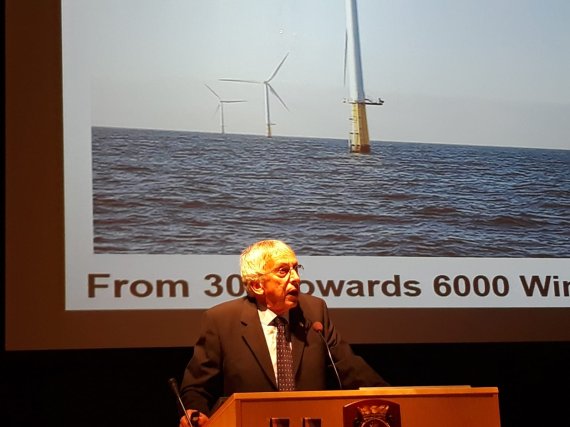Han Lindeboom at the start of his farewell address. © Cecile Leuverink
The marine ecologist officially takes leave, but Wageningen is not free of Han Lindeboom just yet. ‘I still supervise seven PhD candidates, which will take another three years or so. As such, I will keep a guest office at WUR. I will not be resting on my laurels. Actually, I hold cacti anyway.’
A very slight accent reveals Lindeboom’s roots in the eastern part of the Netherlands, although he has been active near and at sea for thirty years. He retired last Friday. To celebrate this, a symposium was organised, during which one of the subjects was the important role the North Sea will have in the energy and food transition.
Parallel approach
It is not just a celebration. His farewell is accompanied by a message from the new emeritus. ‘We are faced with three large transitions that, as far as I’m concerned, should be initiated simultaneously.’ In the next few years, important decisions will be made about sustainable energy, agriculture at sea and how these human activities can be kept in balance with the ecological value of the North Sea.
Sustainable cultures
‘Large windmill parks will arise’, Lindeboom says. ‘Perhaps even on up to 25 percent of the Dutch part of the North Sea. At the same time, we have established that very little fish can be caught in that part of the sea, so we will have to set up active cultures.’ Lindeboom does not allude to fish culture like in Norway, where large cages are used in the sea. ‘From the classic fishery, like the hunter-gatherer, we should develop a more sustainable food production at sea, through aquaculture, for example.’ Lindeboom sees opportunities for the culture of mussels, lobsters, crabs, oysters and seaweed in between the windmill parks.
Closed
According to Lindeboom, we live in the Anthropocene, in which the climate and the atmosphere suffer from the consequences of human activity. He argues for marine reservations that would be sufficiently large to protect the biodiversity and seabed integrity; areas that would be closed to seabed agitation all year round. ‘Look, we are the ones to set the boundary conditions, as the windmill parks will obviously have an influence on the rest of the North Sea. But the next step should not be to constrict the natural areas at sea by species using ecosystem targets, like Natura 2000, because in the end, we cannot steer nature.’ Lindeboom’s biggest wish is for the next generation to be able to say that the North Sea is in balance again, with space for nature and for human use.
The farewell symposium of Han Lindeboom took place Friday afternoon in the Royal Naval College in Den Helder. The symposium was only accessible to those invited.

